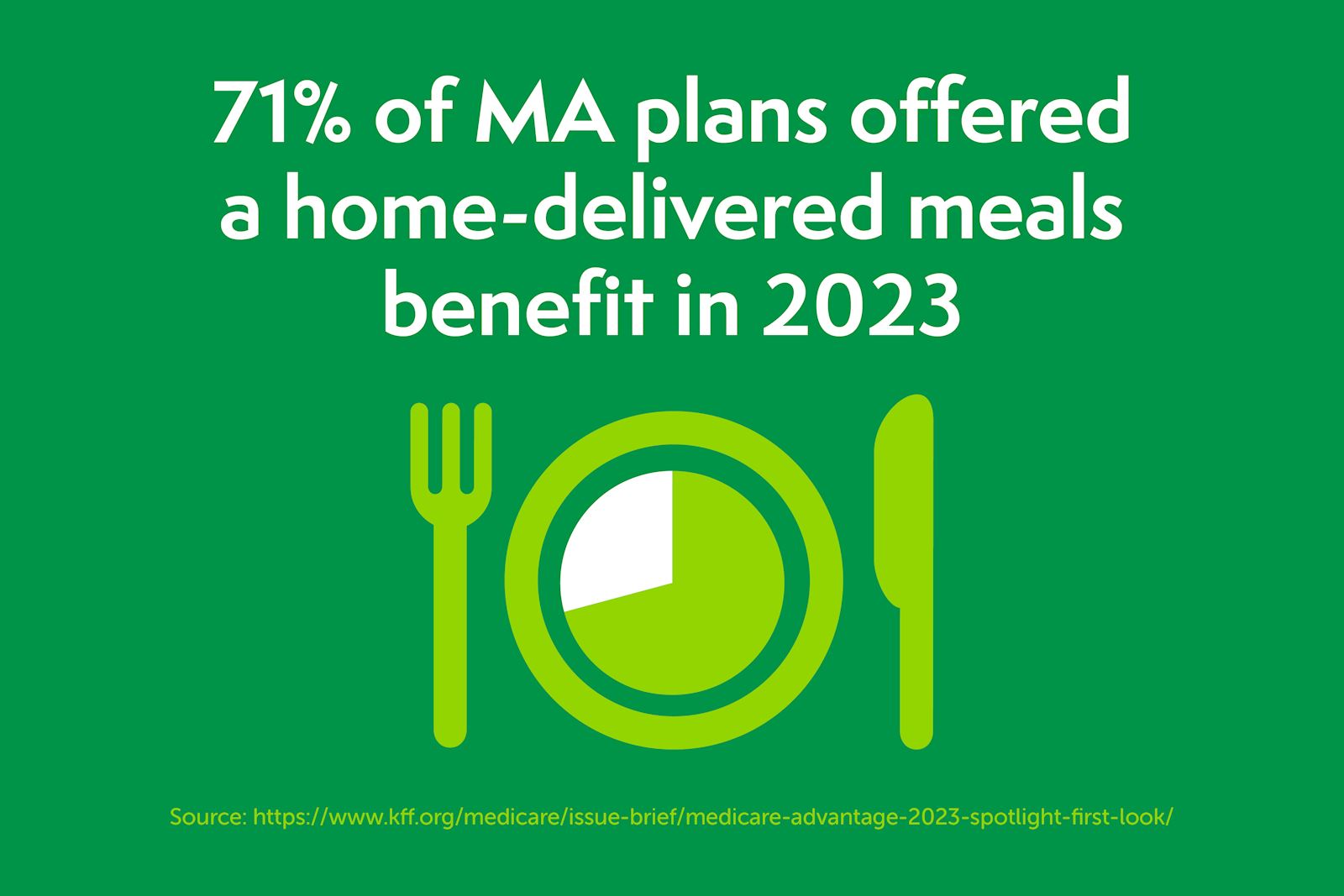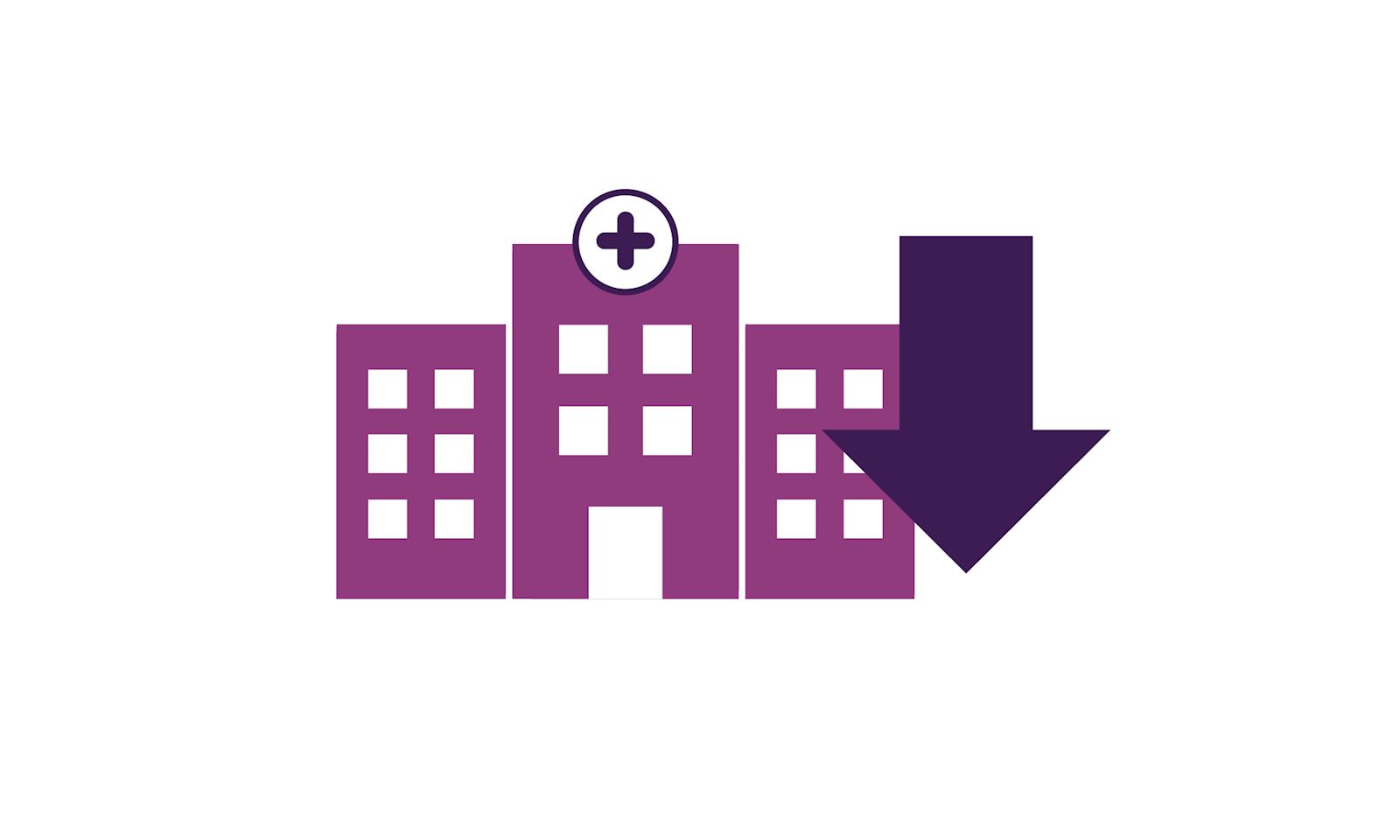The Food as Medicine Concept
Humans have used food as medicine for centuries by cultivating crops for medicinal purposes. The concept of food as medicine has gained considerable traction. This belief is supported by studies showing that even modest dietary adjustments can help to reverse the mortality rates attributable to food-related diseases. In addition, for certain diseases, long-term dietary changes can be as effective as pharmacological interventions — especially in the early stages.
In recent years, health plans, states and other payers are incorporating more food-based benefits, such as medically tailored meals, into their offerings. As a leading provider of comprehensive food as medicine solutions, Mom’s Meals® has developed nutrition offerings for individuals with chronic conditions, those who are homebound, post-discharge patients as well as those who would like to purchase home-delivered meals direct.
Food as medicine solutions help:
- Reduce nutrition insecurity
- Educate people about eating for their chronic condition
- Improve nutrition intake and reduce malnutrition
- Reduce hospitalizations and inpatient stays


Food as Medicine Programs Work
Discover more about the role food as medicine has in improving health outcomes and costs. See case study results using nutrition solutions of medically tailored home-delivered meals, produce and nutrition counseling as part of a holistic approach to better health.
A June 2021 pilot initiative was jointly run by Inland Empire Health Plan in California and Mom’s Meals. Members that took part each had congestive heart failure and a minimum of two hospital stays within the previous year. The six-month program offered participants fully prepared lower-sodium meals, fresh produce and dry goods, nutrition education by Mom’s Meals’ registered dietitians, a digital scale and home visits.
Pilot program outcomes included:
- 50% reduction in hospitalizations and emergency room visits
- Increase in medication adherence
- 25% in total costs for a savings of $1.8 million
Data was reanalyzed 12 months after program end date and found:
- 42% reduction in hospitalizations
- 39% reduction in length of stay
- 21% reduction in total cost of care
Mom’s Meals worked in collaboration with researchers at the University of Illinois at Urbana-Champaign who wanted to know what effect lower-sodium, home-delivered meals would have on patients undergoing hemodialysis (HD) for kidney failure. Three meals a day for four weeks were provided to participants. Researchers hoped to reduce patients’ interdialytic weight gain (IDWG) and “prime” changes in long-term nutrition behavior.
The 2020 pilot program results showed:
- A significant reduction in interdialytic weight gain among volunteers when compared to the usual dietary habits of HD patients
- A reduction in dietary sodium, thirst, dry mouth (xerostomia) scores, and volume overload, blood pressure and serum phosphorus
Health Plan of Nevada, a UnitedHealthcare® Company, partnered with Mom’s Meals to create a pilot program to support diabetes management, by better engaging its members as well as addressing food insecurity and social determinants of health.
In addition to receiving two meals a day for eight weeks, participants with uncontrolled Type 2 diabetes took part in disease management that included counseling.
Results included:
- 17.5% decrease in A1c levels
- Increased overall engagement
- 32% decrease in total cost of care
Another study by Tufts University estimated that expanding national access to medically tailored meals for patients with diet-sensitive conditions could result in:
- A net cost savings of $13.6 billion for payers
- The prevention of 1.6 million hospitalizations annually
AmeriHealth Caritas District of Columbia (DC) and Mom’s Meals have been partners since 2015. In 2022, an analysis was conducted for AmeriHealth Caritas DC managed Medicaid plan members facing health risks identified to participate in a meals program appropriate to their health condition. Participants in the post-discharge program received three medically tailored meals a day for two weeks and nutrition education from registered dietitians.
Post-discharge program outcomes included:
- 29% reduction in emergency medical services
- 17% fewer potentially preventable admissions
- 20% fewer readmissions
- $10 million reduction in total cost of care
The Power of Food as Medicine: What Health Care is Doing and What is Working
Food as medicine is more than a catch phrase or trend. It has deep roots in the past. With today’s increasing food and health inequities, and rising cases of chronic conditions, the costs are skyrocketing. Our white paper proves how together, we all have the power to help heal and lower costs using quality nutrition.
You’ll discover:
- Nutritious food has always had the proven power to heal
- Research, pilot programs and case studies proving quality nutrition helps reduce health care costs through the management of chronic conditions and reduction of hospitalization and readmissions
- Steps health plans, government entities, public and private organizations are taking to make a difference
- How to integrate nutritious food into services and benefits for better health outcomes and total cost of care

Incorporating Medicinal Foods
Poor nutrition is a leading cause of illness in the United States, associated with more than half a million deaths per year. It is linked with an increased risk of diet-related chronic diseases including high blood pressure, diabetes, heart disease, and obesity.
What we eat has the potential to cause disease, as well as the ability to build, maintain and restore health. It’s all about prioritizing food and diet to help prevent, reduce symptoms, or reverse a condition.
Avoiding ultra-processed foods, sugary drinks, saturated and trans fats, and lowering sodium intake can help keep the body healthy. It’s also important to eat the rights foods and consult a doctor before making any dietary changes.
Add these foods into mealtime:
 Fiber
Fiber
It not only helps with the digestive process, but fiber also promotes weight loss, lowers the risk of diabetes and helps manage risk factors that affect heart health such as blood pressure and inflammation.
High-fiber foods include tomatoes, peppers, beans, grains and fruits from trees.
 Fruits and vegetables
Fruits and vegetables
They contain antioxidants that may help protect against cancer and support the immune system.
Examples include cherries, blackberries, oranges, spinach, broccoli and carrots.
 Protein
Protein
The body needs protein to maintain a healthy immune system to ward off illnesses, make enzymes for helping digest food, repair and strengthen muscle, keep bones strong and helps ensure blood and skin cells are continuously replaced as needed.
There are two types of protein: animal and plant. Animal protein is complete and provides all the essential amino acids required by the body.
Animal proteins include beef, pork, poultry, fish and dairy items.
Plant proteins are found in nuts, seeds, dried beans and legumes.
 Healthy fats
Healthy fats
These contain Omega-3 fatty-acids have been found to improve heart health and the immune system. Healthy fats also help fuel the body and help it absorb nutrients.
Examples include seafood, lean meats and low-fat dairy.
Medically Tailored Meals
With nine condition-specific menus and 60+ meal options, there are numerous tasty choices to make. Designed by professional chefs and registered dietitians in USDA-approved kitchens, all our medically tailored meals are made with high-quality ingredients.

Our Programs
No matter the health goal or need, our programs make the path to improving life through better nutrition at home more convenient.
Providing nutrition support for leading chronic health conditions to improve outcomes and reduce the total cost of health care.
Helping individuals maintain independence at home and avoid institutional care.
Supplying expedited nutrition to assist individuals in their recovery after a hospital or skilled nursing stay to reduce readmissions.
Offering our meals to those that want the convenience of home-delivered meals for themselves or a loved one.










.jpg)
